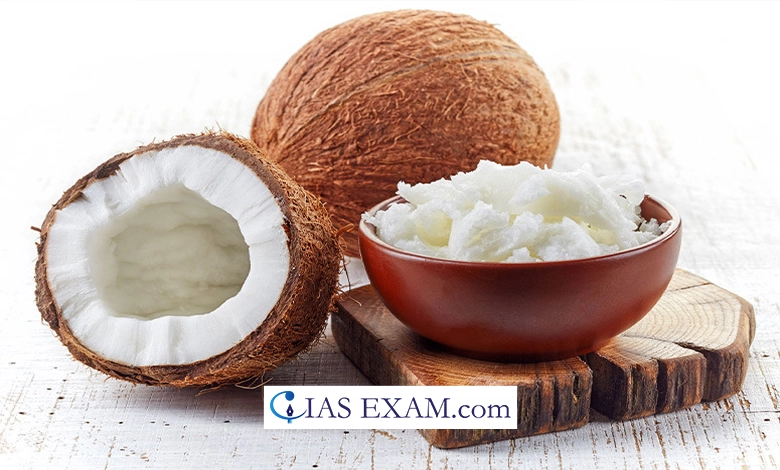
Context
The coconut is a highly adaptable and commonly consumed fruit that has been an important part of various societies for a long time. It offers numerous advantages not only in cooking but also in terms of our well-being, the environment, and the economy.
Role of Coconut
- Coconut occupies a special and a higher place among the many articles used in religious offerings to God.
- In religious and social ceremonies, too, it is a very favourite place as diverse as the zone where it is not originated. No part of the tree is thrown away, and what leaf is left becomes a source for a different utility.
- Every purpose and various daily uses from the roots to the plant like food, feed, and drinks made this tiny tree be forever connected and has become full of culture, social, religious. And the lingual matrix of different communities.
- Coconut is vital in South India as it is in our daily life.
- Each temple has palm trees which are of coconut type, while all the whole nuts of the coconut palm are brought as an offering to the deity and the devotees are given a bit of nut and some coconut water on the behalf of ‘poonak’ as prasadam.
Health Benefits
Coconut is rich in nutrients, including fibre, protein, and healthy fats. Its meat, oil, milk, and water offer numerous health benefits, making it a valuable addition to a balanced diet:
- Weight Management: MCTs found in coconut oils are also helpful in fat burning and fat burning management.
- Improved Digestion: Coconut fibre helps the digestive process with the proper intake of nutrients and the prevention of constipation.
- Boosts Immunity: The effect of coconut oil’s lauric acid (antimicrobial and antifungal) in strengthening the immune system is one of the reasons this oil remains an excellent choice for various healthcare products.
- Heart Health: The saturated fats in the coconut oils increase the HDL cholesterol, which cuts back on the LDL cholesterol, otherwise known as the “bad cholesterol”. Thus, heart disease risks.
Electrolytes, Vitamins, and More
- Coconut water is extracted from yellow coconut juice which is the clear liquid inside the green coconut. Electrolytes, vitamins, and minerals form part of the content of the coconut water.
- While coconut water and coconut milk are both popular, it can be hard at times to distinguish one from the other as the former is made from the water while the latter utilises the water and the yield of mature coconuts.
- About 95% dehydration. The sweet water of the coconut has complimented the diets and roles in medical practices in the tropics for the longest of time.
- However, traditional, Ayurvedic practice associates using coconut water with the proper digestive process, urination, and semen creation.
Environmental Benefits
Coconut trees are a sustainable and eco-friendly resource, offering numerous environmental benefits :
- Carbon Sequestration: Coconut trees absorb carbon dioxide, mitigating climate change.
- Soil Erosion Prevention: Trees roots are a strong binding force on soil. It stops the erosion and always does the job of a hand during floods and landslides.
- Wildlife Habitat: Many animals find their habitat and nesting room in the coconut trees. They also dig into the burying trunks of coconut trees for food.
- Water Conservation: Coconut trees need relatively low amount of water, which makes them a drought-resistant variety
Economic Benefits
Coconut is a lucrative crop, supporting local economies and providing employment opportunities:
- Income Source: Coconut cultivation and related output for farmers and labourers create large incomes copies.
- Export Revenue: Coconut fat is going in high to the demand globe wide, and the economic effect of export.
- Rural Development: Coconut cultivation is a source of rural development enabling poor farmers to rise above poverty.
Culinary and Industrial Uses
Coconut’s versatility extends beyond its health benefits, with various uses in cooking and industry:
- Culinary Delights: Coconut milk, oil, and meat are essential ingredients in larger Latin American cuisines.
- Cosmetics and Skincare: The moisturising characteristics of coconut oil make it a major ingredient used in the manufacture of skincare products.
- Biofuels: In short, coconut oil can be exhumed as bio fuels, which represents an environmentally-friendly option for energy provision.
Conclusion
Coconut’s numerous benefits make it a valuable resource, offering advantages for our health, environment, and economy. Its versatility, sustainability, and cultural significance ensure its continued importance in our lives. Embracing coconut’s benefits can lead to a healthier, more sustainable future.
Source: The Hindu
UPSC Prelims Practice Question
Q. Which of the following is not a part of the coconut plant?
a. Husk b. Shell
c. Endosperm d. Pedicel
Ans- “d”





.png)



